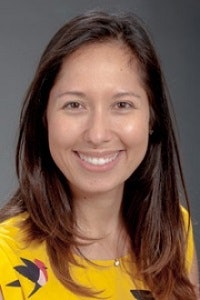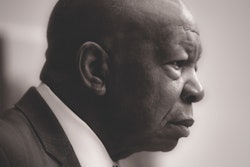Dr. Elyse Hambacher hasn’t forgotten the many inequities she witnessed at her culturally diverse high school in Miami and how her concern about them inspired her to become a teacher educator with a passion for social justice.
“I remember seeing lots of opportunities and privileges given to certain groups of students and not to others,” she says. “I also saw educational disparities and thought, ‘I need to understand this more. Something is not right.’”
So Hambacher teaches from the perspective “that in order to change the current White-dominant system, transformation must begin in the classroom,” observes Dr. Wayne E. Jones, Jr., interim provost and vice president for academic affairs at the University of New Hampshire.
Hambacher specializes in critical pedagogy, Jones explains, “an approach to teaching that helps students scaffold new understandings and actions by contextualizing and grappling with beliefs, practices and systems that have historically advantaged some groups of people and disadvantaged others.”
 Dr. Elyse Lee Hambacher
Dr. Elyse Lee HambacherThat’s important for diversity in higher education, Jones adds, because teacher educators in that vein “seek out voices that have been excluded from mainstream teaching and scholarship, moving these voices from the margins to the center.”
While earning her master’s degree at Columbia University Teachers College in 2005 and 2006, Hambacher substitute taught in New York City public schools. She relocated back to southern Florida – after getting her bachelor’s degree in elementary education from University of Florida (UF) in 2005 – and taught fourth-grade and kindergarten in Broward County public schools with a year in between teaching in Japan.
She served as a research assistant during 2009 at the Florida Excellence in Education Foundation. Following her doctoral fellowship at UF from 2009 to 2013 and receiving her Ph.D. there in 2013, she began her current tenure-track position at UNH.
Hambacher teaches five courses and has designed three online classes: Critical Social Justice in and Beyond Education in 2016, Classroom Management: Creating Positive Learning Environments in 2015 and a critical pedagogy course for doctoral students in 2011, when she was a Teaching and Learning Doctoral Fellow in the College of Education at UF.
She has written or co-written more than a dozen articles in peer-reviewed publications, made more than two dozen national conference presentations as well as local and regional presentations, and garnered numerous grants, fellowships and funding awards.
“One need not look far to recognize Dr. Hambacher’s extraordinary presence on the UNH campus,” says Jones. “Her strong teaching evaluations and maximally enrolled classes indicate that not only is she highly respected among faculty and staff, but also valued by her students.”
Beyond the usual work of teaching, mentoring students and serving on committees, Hambacher has worked extensively beyond the campus.
For example, she collaborated on “Book 2 Art”, a recently launched pilot study involving 14 UNH undergraduate students who aspire to be teachers. It engaged them with pre-K-12 students, families and educators at the Community Literacy Center, a UNH resource, to help kids explore social justice-related topics through children’s literature and art. The series was a vehicle for her students to aid literacy development in young learners while implementing lessons learned about integrating social justice themes in academic settings.
Hambacher also is a co-principal investigator on a 2017 National Science Foundation Noyce Award, “Culturally Responsive and Effective STEM Teaching: Strengthening the Foundation for Teacher Success in High-Need School Districts.”
Hambacher says she loves the UNH education department’s collegiality and focus on strong university-school partnerships. And she tries to follow the best advice given to her regarding her academic career: Follow your heart, relieve yourself of the pressure to do everything and to do it all perfectly, and “find good mentors and collaborators who are really going to push your thinking.”
One of those mentors and collaborators, UF professor Dr. Elizabeth “Buffy” Bondy, “was instrumental in helping me think more deeply about educational research,” says Hambacher.
Bondy lauds Hambacher’s commitment to inclusion of and equity for minority students.
“I am confident that she will continue to contribute to research related to minoritized populations in public schools,” says Bondy. “I imagine that much of her work will continue to be collaborative because she recognizes the value of bringing together diverse perspectives and disciplines to tackle pressing problems. I applaud this approach, as it is apt to be fruitful in addressing increasingly complicated, multidimensional problems.”
LaMont Jones can be reached at [email protected]. You can follow him on Twitter @DrLaMontJones
This article appeared in the January 24, 2018 edition of Diverse.
This is one in a series of profiles about this year’s 2019 Emerging Scholars. Read about all of them here.















